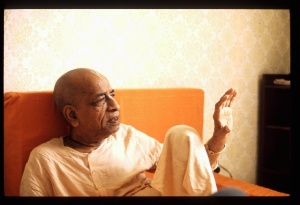CC Madhya 13.137: Difference between revisions
m (1 revision(s)) |
No edit summary |
||
| Line 1: | Line 1: | ||
{{ | [[Category:Sri Caitanya-caritamrta - Madhya-lila Chapter 13|C137]] | ||
<div style="float:left">'''[[Sri Caitanya-caritamrta|Śrī Caitanya-caritāmṛta]] - [[CC Madhya|Madhya-līlā]] - [[CC Madhya 13|Chapter 13: The Ecstatic Dancing of the Lord at Ratha-yātrā]]'''</div> | |||
<div style="float:right">[[File:Go-previous.png|link=CC Madhya 13.136|Madhya-līlā 13.136]] '''[[CC Madhya 13.136|Madhya-līlā 13.136]] - [[CC Madhya 13.138|Madhya-līlā 13.138]]''' [[File:Go-next.png|link=CC Madhya 13.138|Madhya-līlā 13.138]]</div> | |||
{{CompareVersions|CC|Madhya 13.137|CC 1975|CC 1996}} | |||
{{RandomImage}} | |||
==== TEXT 137 ==== | ==== TEXT 137 ==== | ||
<div | <div class="verse"> | ||
anyera hṛdaya—mana, mora mana—vṛndāvana, | :anyera hṛdaya—mana, mora mana—vṛndāvana, | ||
‘mane’ ‘vane’ eka kari’ jāni | :‘mane’ ‘vane’ eka kari’ jāni | ||
tāhāṅ tomāra pada-dvaya, karāha yadi udaya, | :tāhāṅ tomāra pada-dvaya, karāha yadi udaya, | ||
tabe tomāra pūrṇa kṛpā māni | :tabe tomāra pūrṇa kṛpā māni | ||
</div> | </div> | ||
| Line 14: | Line 18: | ||
==== SYNONYMS ==== | ==== SYNONYMS ==== | ||
<div | <div class="synonyms"> | ||
''anyera''—of others; ''hṛdaya''—consciousness; ''mana''—mind; ''mora mana''—My mind; ''vṛndāvana''—Vṛndāvana consciousness; ''mane''—with the mind; ''vane—''with Vṛndāvana; ''eka kari''’—as one and the same; ''jāni''—I know; ''tāhāṅ—''there, at Vṛndāvana; ''tomāra''—Your; ''pada-dvaya''—two lotus feet; ''karāha—''You do; ''yadi''—if; ''udaya''—appearance; ''tabe''—then; ''tomāra—''Your; ''pūrṇa''—complete; ''kṛpā''—mercy; ''māni''—I accept. | |||
</div> | </div> | ||
| Line 21: | Line 25: | ||
==== TRANSLATION ==== | ==== TRANSLATION ==== | ||
<div | <div class="translation"> | ||
Speaking in the mood of Śrīmatī Rādhārāṇī, Caitanya Mahāprabhu said, “For most people, the mind and heart are one, but because My mind is never separated from Vṛndāvana, I consider My mind and Vṛndāvana to be one. My mind is already Vṛndāvana, and since You like Vṛndāvana, will You please place Your lotus feet there? I would deem that Your full mercy. | Speaking in the mood of Śrīmatī Rādhārāṇī, Caitanya Mahāprabhu said, “For most people, the mind and heart are one, but because My mind is never separated from Vṛndāvana, I consider My mind and Vṛndāvana to be one. My mind is already Vṛndāvana, and since You like Vṛndāvana, will You please place Your lotus feet there? I would deem that Your full mercy. | ||
</div> | </div> | ||
| Line 28: | Line 32: | ||
==== PURPORT ==== | ==== PURPORT ==== | ||
<div | <div class="purport"> | ||
The mind’s activities are thinking, feeling and willing, by which the mind accepts materially favorable things and rejects the unfavorable. This is the consciousness of people in general. But when one’s mind does not accept and reject but simply becomes fixed on the lotus feet of Kṛṣṇa, then one’s mind becomes as good as Vṛndāvana. Wherever Kṛṣṇa is, there also are Śrīmatī Rādhārāṇī, the gopīs, the cowherd boys and all the other inhabitants of Vṛndāvana. Thus as soon as one fixes Kṛṣṇa in his mind, his mind becomes identical with Vṛndāvana. In other words, when one’s mind is completely free from all material desires and is engaged only in the service of the Supreme Personality of Godhead, then one always lives in Vṛndāvana, and nowhere else. | The mind’s activities are thinking, feeling and willing, by which the mind accepts materially favorable things and rejects the unfavorable. This is the consciousness of people in general. But when one’s mind does not accept and reject but simply becomes fixed on the lotus feet of Kṛṣṇa, then one’s mind becomes as good as Vṛndāvana. Wherever Kṛṣṇa is, there also are Śrīmatī Rādhārāṇī, the ''gopīs'', the cowherd boys and all the other inhabitants of Vṛndāvana. Thus as soon as one fixes Kṛṣṇa in his mind, his mind becomes identical with Vṛndāvana. In other words, when one’s mind is completely free from all material desires and is engaged only in the service of the Supreme Personality of Godhead, then one always lives in Vṛndāvana, and nowhere else. | ||
</div> | </div> | ||
__NOTOC__ | |||
<div style="float:right; clear:both;">[[File:Go-previous.png|link=CC Madhya 13.136|Madhya-līlā 13.136]] '''[[CC Madhya 13.136|Madhya-līlā 13.136]] - [[CC Madhya 13.138|Madhya-līlā 13.138]]''' [[File:Go-next.png|link=CC Madhya 13.138|Madhya-līlā 13.138]]</div> | |||
__NOTOC__ | |||
__NOEDITSECTION__ | |||
Revision as of 10:54, 25 August 2021

A.C. Bhaktivedanta Swami Prabhupada
TEXT 137
- anyera hṛdaya—mana, mora mana—vṛndāvana,
- ‘mane’ ‘vane’ eka kari’ jāni
- tāhāṅ tomāra pada-dvaya, karāha yadi udaya,
- tabe tomāra pūrṇa kṛpā māni
SYNONYMS
anyera—of others; hṛdaya—consciousness; mana—mind; mora mana—My mind; vṛndāvana—Vṛndāvana consciousness; mane—with the mind; vane—with Vṛndāvana; eka kari’—as one and the same; jāni—I know; tāhāṅ—there, at Vṛndāvana; tomāra—Your; pada-dvaya—two lotus feet; karāha—You do; yadi—if; udaya—appearance; tabe—then; tomāra—Your; pūrṇa—complete; kṛpā—mercy; māni—I accept.
TRANSLATION
Speaking in the mood of Śrīmatī Rādhārāṇī, Caitanya Mahāprabhu said, “For most people, the mind and heart are one, but because My mind is never separated from Vṛndāvana, I consider My mind and Vṛndāvana to be one. My mind is already Vṛndāvana, and since You like Vṛndāvana, will You please place Your lotus feet there? I would deem that Your full mercy.
PURPORT
The mind’s activities are thinking, feeling and willing, by which the mind accepts materially favorable things and rejects the unfavorable. This is the consciousness of people in general. But when one’s mind does not accept and reject but simply becomes fixed on the lotus feet of Kṛṣṇa, then one’s mind becomes as good as Vṛndāvana. Wherever Kṛṣṇa is, there also are Śrīmatī Rādhārāṇī, the gopīs, the cowherd boys and all the other inhabitants of Vṛndāvana. Thus as soon as one fixes Kṛṣṇa in his mind, his mind becomes identical with Vṛndāvana. In other words, when one’s mind is completely free from all material desires and is engaged only in the service of the Supreme Personality of Godhead, then one always lives in Vṛndāvana, and nowhere else.